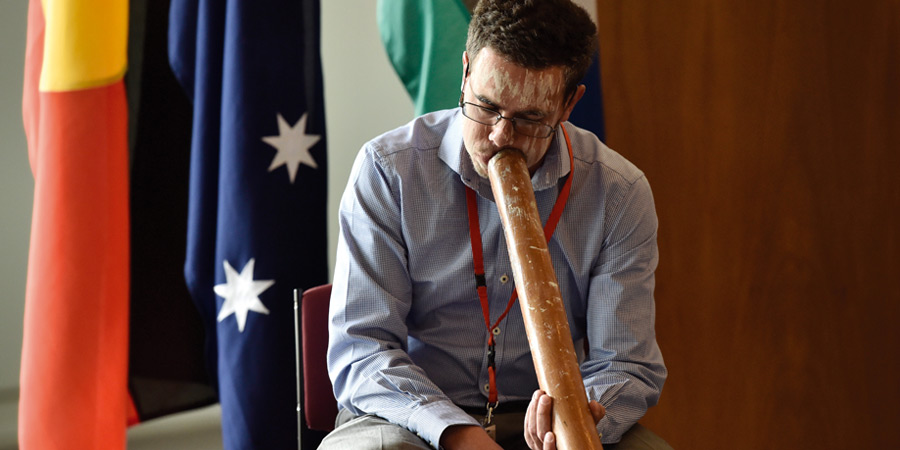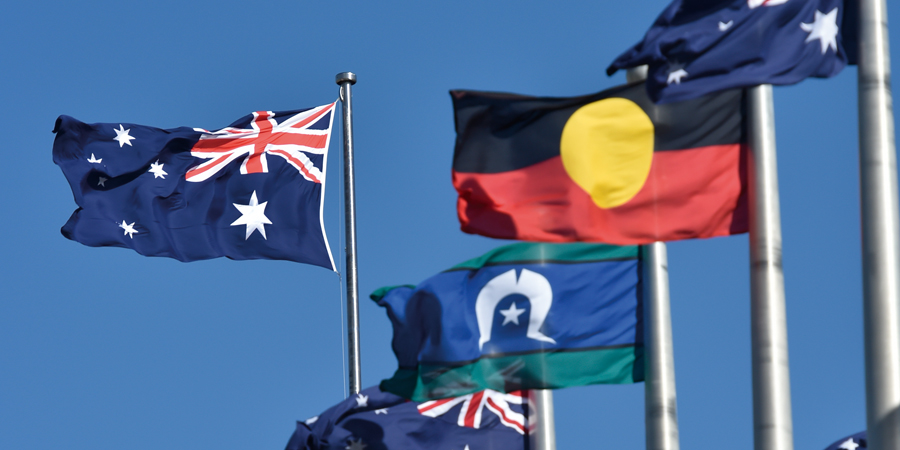On 8 July 2016, during NAIDOC Week, the four parliamentary departments launched their second joint Reconciliation Action Plan. Reconciliation Action Plans, or RAPs, are business plans that set out practical initiatives to build stronger relationships and enhanced respect between Aboriginal and Torres Strait Islander peoples and other Australians and help foster equality by supporting improved opportunities. This second RAP, which has been endorsed by Reconciliation Australia, outlines what the four departments will do to be more actively involved in the journey of reconciliation and to play our part in closing the gap between Aboriginal and Torres Strait Islander peoples and other Australians.

Chaydin Reid, Managing Director of Maluerindi, during National Reconciliation Week, May 2017
Parliamentary Service Indigenous Employee Network
Also in NADIOC week 2016, the Attorney-General’s Department Indigenous Employee Network (AGD’s IEN) invited the parliamentary departments’ Aboriginal and Torres Strait Islander staff to participate in their NAIDOC Week flag raising ceremony. After discussions with the AGD’s IEN about their network, the Parliamentary Service Indigenous Employee Network (PSIEN) was established, with the first meeting held on 2 February 2017. The network has been established to provide a safe supportive environment for all parliamentary service Indigenous employees to meet and express their views, experiences and concerns pertaining to Aboriginal and Torres Strait Islander issues both professionally and personally. The network is supported by the four parliamentary departments.
Jawun secondment
In July 2016, Paul McCabe, a senior project manager in the ICT Division, was seconded from DPS to participate in the JAWUN Indigenous Community APS Secondment Program. This involved a six-week placement in Kununurra with the MG Corporation, an Indigenous organisation funded by the Ord River Scheme. During the secondment, Paul worked closely with the newly appointed community liaison officer to help her move into her new role. This included skills transfer and scheduling a large number of significant meetings with Dawangs (the recognised family/regional groups of local Indigenous people which are led by the Traditional Owners and elders).
Indigenous art protocols, practices and networks
The Parliament House Art Collection is a significant public collection of Australian art and DPS is committed to applying best practice policies and procedures in all aspects of its dealings with Indigenous artists and their works of art. DPS is a member of the Indigenous Art Code, which promotes industry best practice in upholding Indigenous Australian artists’ rights. DPS adopts the Charter of Principles for Publicly Funded Collecting Institutions in managing the Parliament House Art Collection. The charter promotes professional best practice in the acquisition and management of artworks by Indigenous artists.
Protocols for Welcome to Country and Acknowledgement of Country
The parliamentary service RAP Champions, with advice from the Parliamentary Service Indigenous Advisory Group, prepared new protocols to assist parliamentary service employees in organising a Welcome to Country or providing an Acknowledgement of Country at a parliamentary department meeting or event. These protocols were an initiative under the Parliamentary Service Reconciliation Action Plan 2016–18 and were launched in March 2017.

National Reconciliation Week
The National Reconciliation Week program of events started on 26 May 2017 with a moving ceremony held by the Parliamentary Service Indigenous Employee Network. The ceremonial flags were handed to the Parliamentary Service RAP Champions before being flown at the APH entrances.
On 29 May, the portrait of the Hon. Ken Wyatt AM, MP, the first Indigenous Member of the House of Representatives, was unveiled as part of the Historic Memorials Collection and a special exhibition was launched featuring Indigenous parliamentarians: ‘Prevailing Voices: Indigenous Australian Parliamentarians’. A second exhibition, Sageraw Thonar—stories from the south-easterly season, commenced, showcasing large linocut prints from the Badu Art Centre in the Torres Strait. APH also hosted a special broadcast of ABC Television’s ‘Q&A’ program in the Great Hall.
The annual Parliamentary Library National Reconciliation Lecture featured two presentations followed by a panel discussion where members of the audience were encouraged to engage directly with the invited speakers. The speakers at this year’s lecture were Elizabeth Ganter, author of Reluctant Representatives: Blackfella bureaucrats speak in Australia’s north; and Louise Taylor, Deputy CEO of Legal Aid ACT, Associate of the UNSW Indigenous Law Centre, and a member of the Indigenous Legal Issues Committee of the Law Council of Australia.